|
|
|
Sort Order |
|
|
|
Items / Page
|
|
|
|
|
|
|
| Srl | Item |
| 1 |
ID:
079473
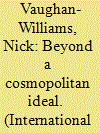

|
|
|
|
|
| Publication |
2007.
|
| Summary/Abstract |
The aim of this paper is to explore alternative ways of thinking about ethics in world politics beyond the polis, the cosmopolis, and this tired and totalising dichotomy. However, conventional forms of political criticism are said to be inadequate to the task because the dominant theories, logics and categories through which the 'beyond' might be formulated tend to be contaminated by this very dichotomy. Therefore, drawing chiefly on the insights of Jacques Derrida and Jean-Luc Nancy, I argue that new imaginaries are required. In particular, I suggest that the concept of singularity offers theorists of international politics an alternative site around which the realm of the ethico-political may be re-conceptualised.
|
|
|
|
|
|
|
|
|
|
|
|
|
|
|
|
| 2 |
ID:
094592
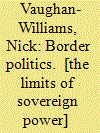

|
|
|
|
|
| Publication |
Edinburgh, Edinburgh Unitversity Press, 2009.
|
| Description |
ix, 190p.
|
| Standard Number |
9780748637324
|
|
|
|
|
|
|
|
|
|
|
|
Copies: C:1/I:0,R:0,Q:0
Circulation
| Accession# | Call# | Current Location | Status | Policy | Location |
| 054844 | 320.12/VAU 054844 | Main | On Shelf | General | |
|
|
|
|
| 3 |
ID:
117436
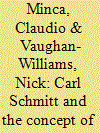

|
|
|
|
|
| Publication |
2012.
|
| Summary/Abstract |
The paper investigates the promise of Carl Schmitt's concept of 'nomos' for developing new spatial imaginaries apposite to the study of 'the border' in contemporary political life, as per the aims of the 'Lines in the Sand' research agenda. Schmitt introduced the idea of a 'nomos of the earth' to refer to the fundamental relation between space and political order. There have been various historical expressions of the nomos, from the Respublica Christiana, to the jus publicum Europaeum, to a post-World War II (dis)order yet to be adequately theorised. We aim to explore the relatively overlooked spatial ontology of Schmitt's work and suggest ways in which it might prompt alternative ways of thinking about borders and bordering practices as representative of broader dynamics in the relation between space and political order.
|
|
|
|
|
|
|
|
|
|
|
|
|
|
|
|
| 4 |
ID:
102461
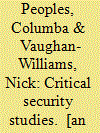

|
|
|
|
|
| Publication |
London, Routeldge, 2010.
|
| Description |
vii, 182p.
|
| Standard Number |
9780415484442
|
|
|
|
|
|
|
|
|
|
|
|
Copies: C:1/I:0,R:0,Q:0
Circulation
| Accession# | Call# | Current Location | Status | Policy | Location |
| 055853 | 355.033/PEO 055853 | Main | On Shelf | General | |
|
|
|
|
| 5 |
ID:
151176


|
|
|
|
|
| Summary/Abstract |
The performance of International Relations (IR) scholarship – as in all scholarship – acts to close and police the boundaries of the discipline in ways that reflect power–knowledge relations. This has led to the development of two strands of work in ontological security studies in IR, which divide on questions of ontological choice and the nature of the deployment of the concept of dread. Neither strand is intellectually superior to the other and both are internally heterogeneous. That there are two strands, however, is the product of the performance of IR scholarship, and the two strands themselves perform distinct roles. One allows ontological security studies to engage with the ‘mainstream’ in IR; the other allows ‘international’ elements of ontological security to engage with the social sciences more generally. Ironically, both can be read as symptoms of the discipline’s issues with its own ontological (in)security. We reflect on these intellectual dynamics and their implications and prompt a new departure by connecting ontological security studies in IR with the emerging interdisciplinary fields of the ‘vernacular’ and ‘everyday’ via the mutual interest in biographical narratives of the self and the work that they do politically.
|
|
|
|
|
|
|
|
|
|
|
|
|
|
|
|
| 6 |
ID:
092434
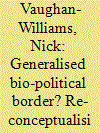

|
|
|
|
|
| Publication |
2009.
|
| Summary/Abstract |
This article is a response to calls from a number of theorists in International Relations and related disciplines for the need to develop alternative ways of thinking 'the border' in contemporary political life. These calls stem from an apparent tension between the increasing complexity of the nature and location of bordering practices on the one hand and yet the relative simplicity with which borders often continue to be treated on the other. One of the intellectual challenges, however, is that many of the resources in political thought to which we might turn for new border vocabularies already rely on unproblematised conceptions of what and where borders are. It is argued that some promise can be found in the work of Italian philosopher Giorgio Agamben, whose diagnosis of the operation of sovereign power in terms of the production of bare life offers significant, yet largely untapped, implications for analysing borders and the politics of space across a global bio-political terrain.
|
|
|
|
|
|
|
|
|
|
|
|
|
|
|
|
| 7 |
ID:
114564


|
|
|
| 8 |
ID:
177947


|
|
|
|
|
| Summary/Abstract |
Differences between women and men in perceptions of security threats are firmly established in public opinion research, with the ‘male warrior’ and the ‘worried woman’ two well-documented stereotypes. Yet, we argue in this article, the differences are not as well understood as such labels, or the search for explanations, imply. One reason for this is the lack of dialogue between public opinion research and feminist security studies. In bringing the two fields into conversation by analysing mixed methods research data gathered in Britain, we suggest that while the extent of the gender gap in opinions of security is overstated, the gaps that do exist are more complex than previously allowed: men and women define ‘security’ in slightly different ways; women tend to identify more security threats than men not necessarily because they feel more threatened but due to a greater capacity to consider security from perspectives beyond their own; women are more confident about the government's ability to deal with security threats in the future but not simply because of greater faith in government than men. This complexity implies a need to revisit assumptions, methods, and analytical approaches in order to develop the field of gender and security further.
|
|
|
|
|
|
|
|
|
|
|
|
|
|
|
|
| 9 |
ID:
139566
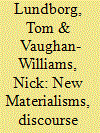

|
|
|
|
|
| Summary/Abstract |
This article investigates the recent ‘New Materialisms’ turn in social and political thought and asks what the potential theoretical and methodological significance might be for the study of International Relations (IR). To do so we return to debates about the theoretical status of discourse in IR as it is in this context that the question of materiality – particularly as it relates to language – has featured prominently in recent years. While the concept of discourse is increasingly narrow in IR, the ‘New Materialisms’ literature emphasises the political force of materiality beyond language and representation. However, a move to reprioritise the politics of materiality over that of language and representation is equally problematic since it perpetuates rather than challenges the notion of a prior distinction between language and materiality. In response, we draw on earlier poststructural thought in order to displace this dichotomy and articulate an extended understanding of what analysing ‘discourse’ might mean in the study of IR.
|
|
|
|
|
|
|
|
|
|
|
|
|
|
|
|
| 10 |
ID:
109462
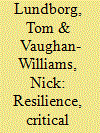

|
|
|
|
|
| Publication |
2011.
|
| Summary/Abstract |
This article investigates the political significance of the orientation of Western security relations around critical infrastructure (CI) and resilience planning. While the analysis is located in the International Political Sociology literature, it departs from recent biopolitical accounts of CIs and resilience. These accounts tend to present such apparatuses as closed, totalizing, and inevitably "successful" modes of governance. Rather, we argue that resilient CIs are open, vulnerable, and often absurd systems that continually falter, backfire, and often undermine themselves according to their own logic. By developing what we call a "molecular security" approach, we draw attention to the way in which life constantly evades capture. In this sense, we suggest, there is always an excess of "life" in biopolitics.
|
|
|
|
|
|
|
|
|
|
|
|
|
|
|
|
| 11 |
ID:
137014


|
|
|
|
|
| Summary/Abstract |
This article critically examines the performative politics of resilience in the context of the current UK Civil Contingencies (UKCC) agenda. It places resilience within a wider politics of (in)security that seeks to govern risk by folding uncertainty into everyday practices that plan for, pre-empt, and imagine extreme events. Moving beyond existing diagnoses of resilience based either on ecological adaptation or neoliberal governmentality, we develop a performative approach that highlights the instability, contingency, and ambiguity within attempts to govern uncertainties. This performative politics of resilience is investigated via two case studies that explore 1) critical national infrastructure protection and 2) humanitarian emergency preparedness. By drawing attention to the particularities of how resilient knowledge is performed and what it does in diverse contexts, we repoliticize resilience as an ongoing, incomplete, and potentially self-undermining discourse.
|
|
|
|
|
|
|
|
|
|
|
|
|
|
|
|
| 12 |
ID:
077878


|
|
|
|
|
| Publication |
2007.
|
| Summary/Abstract |
The shooting of Jean Charles de Menezes in Stockwell Station, South London, on 22 July 2005, was described as a "tragic mistake" by Metropolitan Police Commissioner Sir Ian Blair. This framing of the killing has come to dominate responses to it in the mainstream media. However, such a framing stymies critical questioning about what happened and colludes in the reproduction of a particular framework of understanding within which sovereign power has retrospectively valorized his death. By contrast this article reads the shooting as one of multiple responses of the British state to the bombings of the London transport network on 7 July 2005 and locates Menezes' death within the broader context of the global "War on Terror." Rather than a "mistake," the author argues that the shooting is symptomatic of systemic features of Western politics and in particular innovations in the ways sovereign power attempts to secure the spatial and temporal borders of sovereign political community
|
|
|
|
|
|
|
|
|
|
|
|
|
|
|
|
| 13 |
ID:
161273


|
|
|
|
|
| Summary/Abstract |
Our primary aim in this article is to explore vernacular constructions of Europe’s so-called ‘migration crisis’ from the grounded everyday perspectives of EU citizens. We do so as a critical counterpoint to dominant elite scripts of the crisis, which are often reliant upon securitised representations of public opinion as being overwhelmingly hostile to migrants and refugees and straightforwardly in favour of tougher deterrent border security. In addition to broadening the range of issues analysed in vernacular security studies, the article seeks to make three principal contributions. Theoretically, we argue for an approach to the study of citizens’ views and experiences of migration and border security that is sensitive to the performative effects of research methods and the circular logic between securitising modes of knowledge production and policy justification. Methodologically, we outline and apply an alternative approach in response to these dynamics, drawing on the potential of critical focus groups and a desecuritising ethos. Empirically, we identify a vernacular theory of ‘the border’ as information management, and a significant information gap prevalent among participants with otherwise opposing views towards migration. These findings challenge bifurcated understandings of public opinion towards migration into Europe and point to the existence of vernacular border security imaginaries beyond either ‘closed’ or ‘open’ borders.
|
|
|
|
|
|
|
|
|
|
|
|
|
|
|
|
| 14 |
ID:
143310
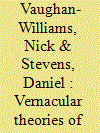

|
|
|
|
|
| Summary/Abstract |
Citizens increasingly occupy a central role in the policy rhetoric of British National Security Strategies, and yet the technocratic methods by which risks and threats are assessed and prioritized do not consider the views and experiences of diverse publics. Equally, security studies in both ‘traditional’ and ‘critical’ guises has privileged analysis of elites over the political subject of threat and (in)security. Contributing to the recent ‘vernacular’ and ‘everyday’ turns, this article draws on extensive critical focus-group research carried out in 2012 across six British cities in order to investigate (1) which issues citizens find threatening and how they know, construct and narrate ‘security threats’, and (2) the extent to which citizens are aware of, engage with and/or refuse government efforts to foster vigilance and suspicion in public spaces. Instead of making generalizations about what particular ‘types’ of citizens think, however, we develop a ‘disruptive’ approach inspired by the work of Jacques Rancière. While many of the views, anecdotes and stories reproduce the police order, in Rancière’s terms, it is also possible to identify political discourses that disrupt dominant understandings of threat and (in)security, repoliticize the grounds on which national security agendas are authorized, and reveal actually existing alternatives to cultures of suspicion and unease.
|
|
|
|
|
|
|
|
|
|
|
|
|
|
|
|
|
|
|
|
|